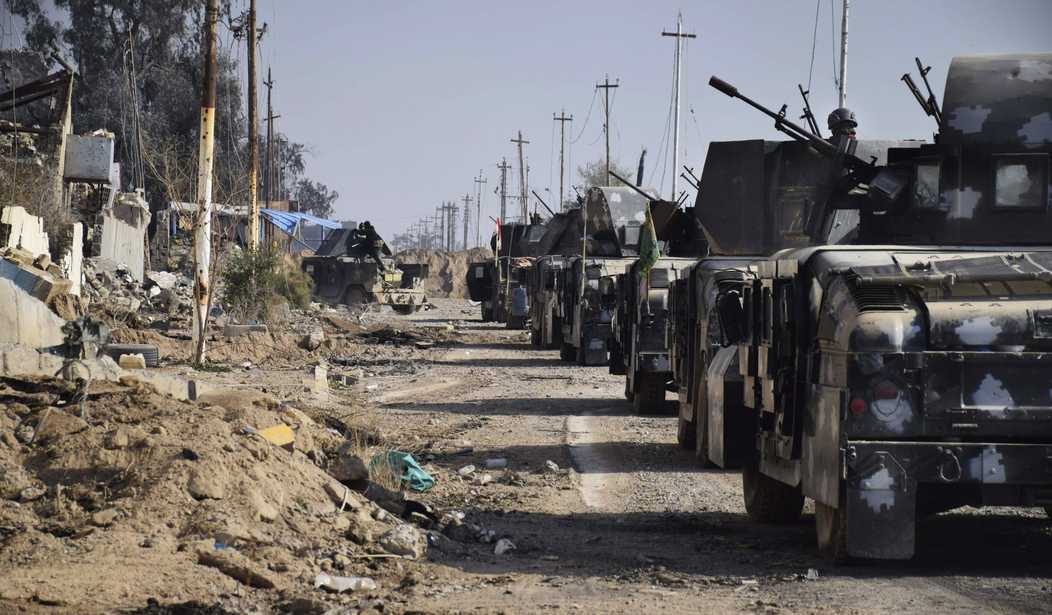The spokesman for U.S. operations against ISIS in Iraq said remaining jihadists in Ramadi probably don’t have the “oomph” to repel Iraqi forces.
Col. Steve Warren, spokesman for Operation Inherent Resolve, told reporters via teleconference from Baghdad that “the Iraqi security forces have achieved considerable success in Ramadi.”
“The coalition conducted more than 630 airstrikes since July, with more than 150 occurring in the last month alone. We trained several of the Iraqi army brigades, CTS units and police forces who fought there. We provided specialized engineering equipment to clear IEDs, a floating bridge to help get combat power into downtown Ramadi, and we partnered with the Iraqis to give advice and assistance at multiple Iraqi army headquarters,” he said.
Much of Ramadi is still under ISIS control or contested, with “several close fights ongoing” during the morning briefing.
Warren said they don’t have a casualty count yet from Iraqi forces, but it’s believed to be “really in the low double digits, if that.”
And they also “don’t have a good count — a good head count of the enemy in Ramadi.”
“What we do believe is that their capability is reduced, right? So often, we think less about numbers and more about what can they do. We don’t think that the remaining enemy has the oomph to push the Iraqi security forces off of their positions,” he added.
There were “several counterattacks” from ISIS against Iraqi forces today, which Warren characterized as “small.”
“Generally, these take the form of a team, maybe with a heavy machine gun or maybe with an RPG, so a team three to five conducting harassing attacks,” he said. “We have not seen this enemy able to mass any type of combat, any type of real combat power in any type of effort to really conduct a conservative counterattack. It doesn’t mean it’s impossible, it just means we haven’t seen it yet. We believe the majority of this enemy has been dispersed into smaller pockets. Many have moved kind of north and east… we saw them actually loading up families into their cars. We don’t know if it was their own families or if these were others. We think it was their families.”
Warren said it’s a “fair assessment” that “80 percent of the effort in Ramadi was due to coalition airstrikes.”
“And this is what really facilitated or enabled the Iraqi forces to move in,” he said. “And this is how modern warfare is, by the way. This is no different than the way any army should fight. It’s using that air power as the force multiplier that it is.”
To clear Ramadi, Iraq forces first have to retake remaining ISIS areas and then hunt for booby traps left behind.
“This going to take a while, because any house could be rigged to blow,” Warren explained. “So as the Iraqi forces are trying to dismantle these various booby-traps, they still have to be on the lookout for the remaining bands of ISIL fighters who are out to harass them. So, it will be a process… But it will take some time, I will tell you that much.”
Sunni tribesmen “were not, frankly, a significant player in the seizure of Ramadi,” he said, but “they will be significant players in the stabilization and the holding of Ramadi” as “right now, we envision the Iraqi security forces moving to other battlefields.” The U.S. has pledged millions toward Ramadi reconstruction.
Warren said they believed the number of ISIS fighters in Ramadi, once a city of some 200,000 people, was “at points” probably “as high as 800 to 1,000.”
“When the Iraqi security forces crossed the river into — to enter southern Ramadi, we believed at that point there was maybe 250 to 350 left in the center of town. Since then, we’ve killed at least 100 of them from the air,” he said. “…We put ISIL in this spot where he can stay where he is and get shot, or he can get up and move and be bombed — which is a tough choice to make, but always ends up with the same result.”
“We saw real hard fighting, but it was ineffective, right? I mean, the Iraqi security forces had, you know, the unparalleled ability of the coalition air to place pressure on this enemy and to suppress them… They’re not 10 feet tall. These guys are not that tough.”









Join the conversation as a VIP Member